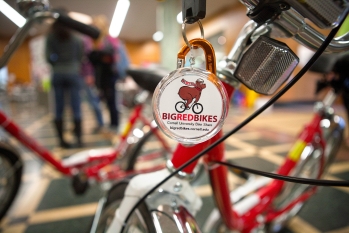COVER STORY SIDEBAR
Creating a sustainable campus
Two years ago Cornell became one of the first universities in the United States to lay out a road map for campus sustainability. The Climate Action Plan calls for net zero emissions – no carbon footprint – on the Ithaca campus by 2050. Already, the university has reduced emissions by 25 percent, largely due to a new combined heat and power plant and an end to coal use on campus.

Campus student sustainability groups such as Sustainability Hub, Big Red Bikes, KyotoNow, Sustainable Global Enterprise Club, Take Back the Tap and the Cornell Farm to School Program have doubled in the last six years to more than 30. See larger image
Cornell's sustainability efforts include diverting 117,000 pounds of dining waste to compost every month (reducing Cornell's landfill by half); the building of Silver, Gold and Platinum LEED (Leadership in Energy and Environmental Design) certified facilities; and implementation of dozens of new policies and practices – many initiated by student advocates, others as a result of staff and faculty initiative – that shrink Cornell's ecological footprint and reduce costs associated with energy and other resources.
Campus student sustainability groups, such as Sustainability Hub, Big Red Bikes (photo, above), KyotoNow, Sustainable Global Enterprise Club, Take Back the Tap and the Cornell Farm to School Program, have doubled in the last six years to more than 30.
In October, the university unveiled the Cornell Sustainability Plan, which brings together green groups and initiatives and coordinates initiatives on the Ithaca campus.
"The Sustainability Plan articulates our vision of how our academics, students and operations will work together to create a more sustainable campus and foster a living laboratory environment that will also aid teaching and research," says Bert Bland, senior director of Cornell's newly formed Sustainability Office.
The plan was developed by the President's Sustainable Campus Committee (PSCC), which provides broad oversight on administrative decisions that affect campus, local and regional sustainability, and supports a culture of sustainability through collaborations among staff, students, faculty and regional partners.
Close partnerships among operations, academics and administrative leadership make Cornell's approach to sustainability unique, according to Kyu Whang, vice president for facilities services and co-chair of PSCC. Whang, whose operations include 850 employees, considers sustainability central to every area under his leadership, from transportation to landscaping to facilities management, design and maintenance.
The PSCC tracks sustainability metrics and leads Cornell's participation in the Sustainability Tracking, Assessment and Rating System, a self-reporting framework for colleges and universities to measure their performance. Major to PSCC's activities are 10 focus teams, which, along with the Sustainability Office, implement, manage and coordinate green efforts on campus. They are:
People: helped form the Eco-Reps Program, which this fall recruited 24 students to be sustainability educators in their residence halls. An introduction to sustainability is being built into new employee, freshman and transfer student orientations, and this spring a sustainability course will be offered for managers.
Water: works with students and staff to reduce the trucking of large plastic water-filled bottles for office water coolers. The team and campus groups like Take Back the Tap want to increase the consumption of tap water. The team also oversees maintenance of campus water filtration and storage systems; issues of storm-water planning and management; and watershed and ecosystem protection.
Food: helps build a regional, sustainable food system, in part by encouraging local food purchases, including through a partnership with the Cornell University Agricultural Experiment Station, which operates crop and vegetable research farms for the College of Agriculture and Life Sciences. It supports an annual dinner that features local and New York state farmers and merchants, and is key to composting and recycling education efforts in the dining halls.
Land: helps to implement the goals of the Cornell Master Plan, a guide for long-term green development on Cornell lands.
Energy: facilitates Cornell's efforts to reduce energy use by conserving, increasing efficiency, and switching to cleaner, renewable energy.
Purchasing: promotes Energy Star products, sweatshop-free apparel, recycled paper, and compostable and reduced-packaging products.
Transportation: is partnering with the Tompkins County Area Transit authority and such local and campus groups as Ithaca Carshare and Big Red Bikes.
Waste: supports the efforts of Cornell's recycling and solid waste department, which introduced single-stream recycling in fall 2011.
Climate: is committed to measuring and reducing greenhouse gas emissions on campus.
Buildings: works to improve the sustainability of campus buildings.
See www.sustainablecampus.cornell.edu and now.cornell.edu/sustainability/ for details.